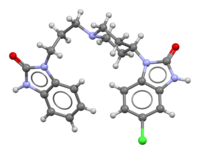
Photo from wikipedia
Ivermectin (IVM) is an antiparasitic agent widely used in agricultural, domestic animals and in human clinical practice. In the present study, the temporal effects of therapeutic doses of IVM in… Click to show full abstract
Ivermectin (IVM) is an antiparasitic agent widely used in agricultural, domestic animals and in human clinical practice. In the present study, the temporal effects of therapeutic doses of IVM in the morphometric and histological assessment of testis were studied to verify if IVM acute administration impaired the spermatogenesis and spermiogenesis of adult rats, if these effects are reversible. The testosterone levels and the plasmatic IVM levels were assessed. The results show: 1) IVM acute exposure, mainly in the higher dose, reduced the testicular volume, the tubular diameter and the germinal epithelium height; 2) no interferences on Leydig cells frequency; 3) histological studies show that tubular sections containing several histological changes indicative of spermatogenesis interruption, such as disorganization of germinal epithelium, vacuolar degeneration of the germ cells and sloughing of cells into the tubular lumen; 4) no differences in testosterone levels; 5) The IVM plasmatic levels were significantly reduced at 72h after the 0.2mg/kg. It was concluded that acute IVM impaired the spermatogenesis and spermiogenesis of rats. Probably these effects were not consequence of IVM at the Leydig cells because no effects were observed at this level. Finally, our results suggest that some testicular effects are reversible and correlated with the plasmatic levels of IVM.
Journal Title: Research in veterinary science
Year Published: 2018
Link to full text (if available)
Share on Social Media: Sign Up to like & get
recommendations!